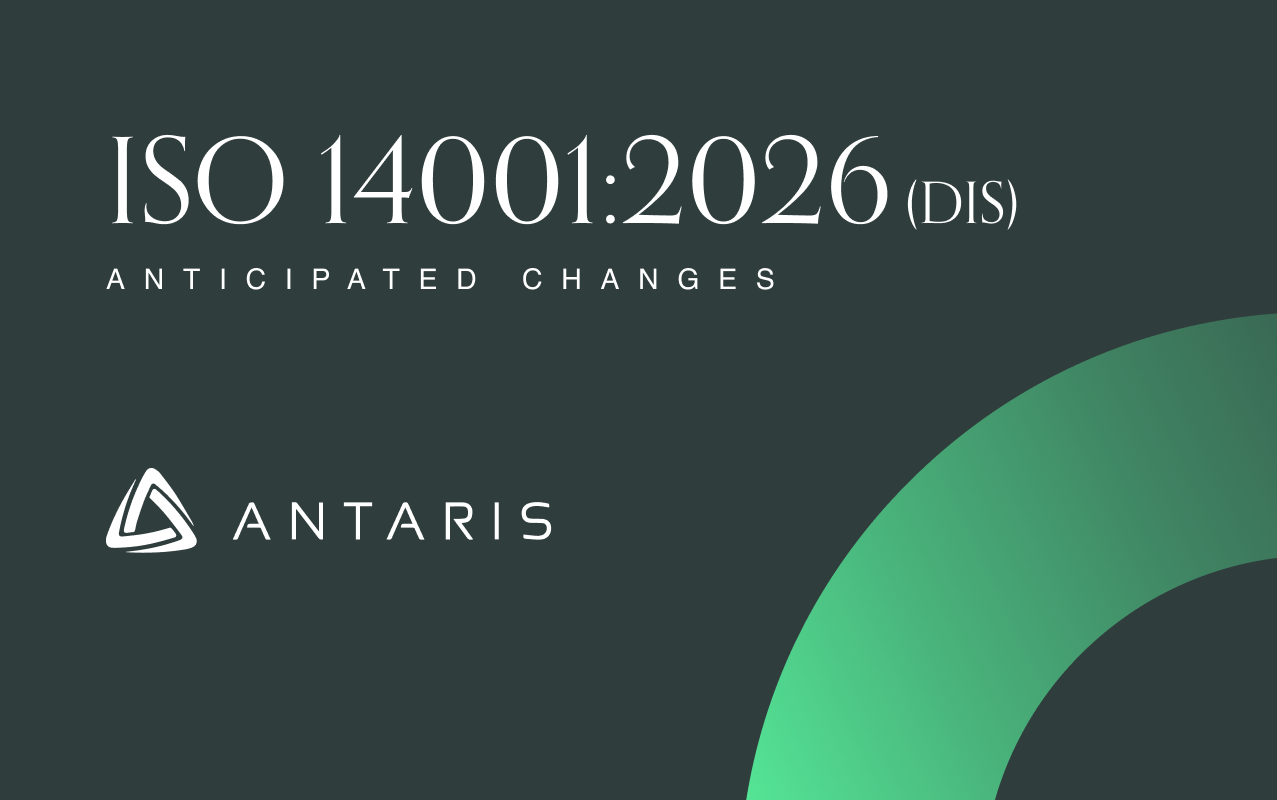Climate Change and ISO Standards: How to easily understand the new Climate Change clause in your ISO management system
ISO policy change regarding addition of Climate Change to all management system standards
On 22 February 2024, the International Accreditation Forum (IAF) and the International Organisation for Standardisation (ISO) published an amendment for climate action changes relevant to new and existing ISO management systems standards. The amendment is available here: Microsoft Word – Joint ISO-IAF Communique re Climate Change Amds to ISO MSS Feb 2024_Final.docx and read our related blog here: New ISO Policy Change: significant addition of Climate Change to all management system standards – Antaris Consulting
All organisations certified to any ISO management system standard such as ISO 9001, ISO 14001, ISO 45001, ISO 50001, and ISO 27001 must now consider if Climate Change is a relevant issue within each management system. There are no actual documentary changes to any of the management system standards, but the proposed amendments take immediate effect and require immediate action by applicable organisations.
All ISO-certified organisations must now ensure that they have considered Climate Change aspects and risks within the development, maintenance, and effectiveness of their own management system or systems.
Climate Change, along with other issues, should be determined as relevant or not and if so, considered as an integral part of the risk evaluation process, within the scope of the management systems standards. Where an organisation operates more than one management system (for example ISO 9001 and ISO 45001), it must ensure that Climate Change, if determined to be relevant, is considered within the scope of each management system standard.
By identifying relevant aspects of climate change as part of its “context”, the organisation should then take these aspects into account in its management system, by assessing the relevant risks and taking action to address them.
Climate Change and ISO Standards: What will the Certification Bodies Consider?
Certification bodies will, during their certification audits, assess if all relevant internal and external issues have been considered by the organisation in the development and effectiveness of its management system(s), as required by clause 4.1: Understanding the organisation and its context and clause 4.2: Understanding the needs and expectations of stakeholders.
They will be looking for objective evidence that Climate Change has been considered by the organisation and if deemed to be relevant, that it is included in the organisation’s risk evaluation process. If Climate Change is not considered relevant by the organisation, the certification body will be looking for evidence that the organisation’s rationale for this determination is valid and effective.
Changes in subclauses 4.1 and 4.2 may trigger changes in other clauses of the organisation’s management system (s) such as:
- Risks and opportunities
- Compliance obligations
- Communications
- Resources
- Competence
- Monitoring, measurement, analysis and evaluation
Climate Change and ISO Standards: Internal and External Issues
Examples of external and internal issues related to climate change include:
Climate Change and ISO Standards: ISO 9001
Internal Issues:
- Impact on the availability of resources, including raw materials, due to climate change.
- Efficiency and performance of equipment under adverse climate conditions.
External Issues:
- Disruptions in the supply chain due to extreme weather events impacting suppliers.
- Compliance with new quality standards and regulations that emerge in response to climate change.
Climate Change and ISO Standards: ISO 14001
Internal Issues:
- Challenges in controlling aqueous and gaseous emissions and managing waste under changing environmental conditions.
- Risks to physical infrastructure from extreme weather events and changing climate patterns.
External Issues:
- Greater expectations from stakeholders such as customers, investors, and the public with regards environmental probity.
- New environmental and sustainability statutory and regulatory requirements in response to climate change.
- Market opportunities: Emerging markets for environmentally friendly products and services in response to climate change.
Climate Change and ISO Standards: ISO 45001
Internal issues:
- Extreme weather events causing injury to workers.
- Actions associated with climate mitigation, such as the installation of on-site renewable energy generation, may introduce new risks – e.g. working at height or working in confined spaces risks where maintenance of the equipment is required.
- Increased training burden due to climate change.
External issues:
- New health and safety legislation in response to climate change.
- Emerging health concerns with regards climate change such as increased exposure to sunlight.
- Greater expectations from stakeholders such as suppliers and contractors with regards health and safety responsibility.
Climate Change and ISO Standards: ISO 27001
Internal Issues:
- Vulnerability of IT infrastructure to climate-induced events (such as extreme temperatures or floods).
- Impact on employee availability and productivity due to extreme weather events.
- Severe weather can cause power outages, threatening data integrity, confidentiality and availability.
External Issues:
- New legislation regarding business continuity in response to climate change.
- Service delivery of external suppliers adversely affected by climate change.
Climate Change and ISO Standards: ISO 50001
Internal issues:
- Altered climate patterns may raise energy costs.
- Energy efficiency and performance of equipment adversely affected by altered climate conditions.
External issues:
- Emerging markets for energy-efficiency products and services in response to climate change.
- More demanding energy statutory and regulatory requirements in response to climate change.
It should be noted that issues relating to Climate Change affecting the context of the organisation’s management system(s) are typically already being considered by organisations.








